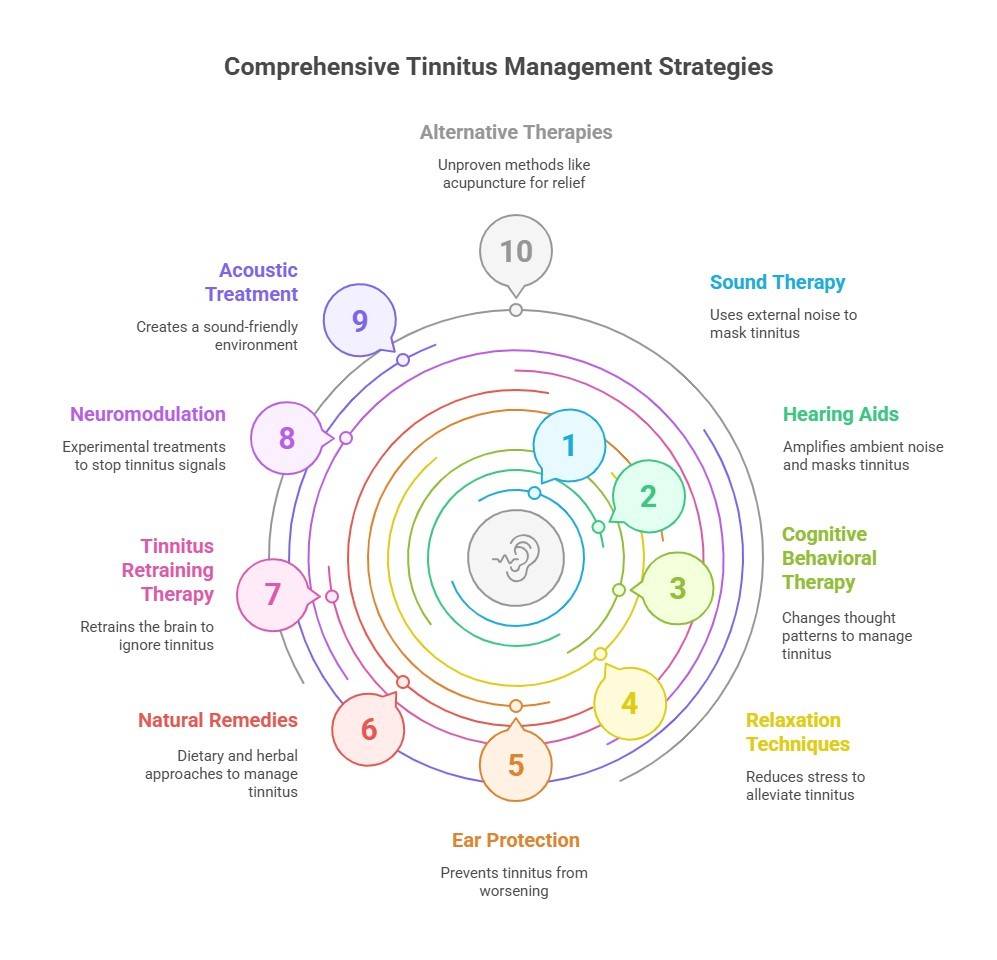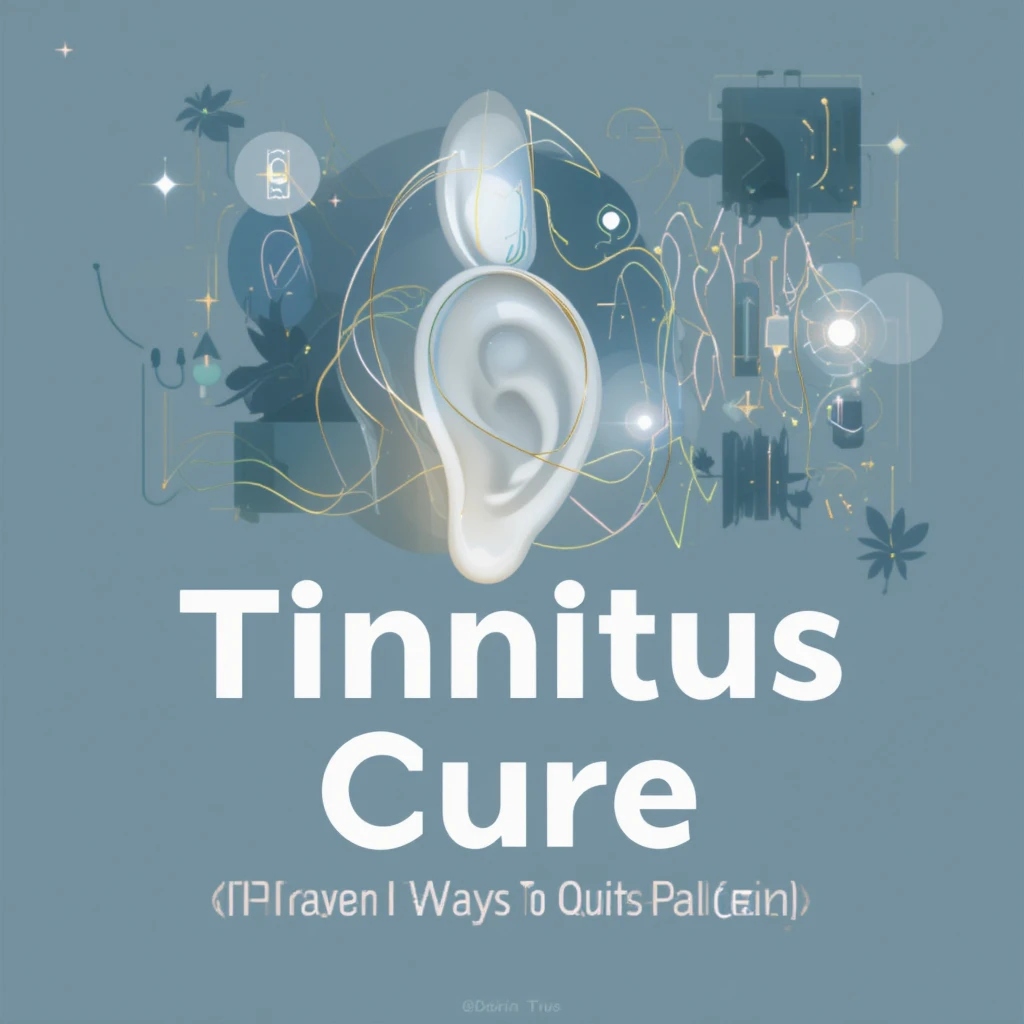Tinnitus cure options are what many people search for when they can’t take the constant noise anymore. I have seen how this non-stop ringing, buzzing, or whooshing sound can make daily life hard. The good news is that while there is no single magic fix, there are many ways to find relief. In this post, I’ll share 10 proven ways to help quiet those annoying sounds and give you peace again.
What Is Tinnitus and Why Do We Need a Tinnitus Cure?
Tinnitus is perceiving sounds that lack an external source. These sounds can be ringing, buzzing, hissing, or humming. I have talked with many people who say it sounds like:
- Bells ringing
- Wind blowing
- Ocean waves
- Crickets chirping
- A machine humming
About 1 in 7 people have tinnitus. That’s millions of people looking for a tinnitus cure or relief every day!
Tinnitus is not a disease on its own. It is a sign that something else might be mistaken. Sound might manifest in one ear or both. It can be soft or loud. It can come and go, or it can stay all the time.
Understanding Tinnitus Treatment Options Before Seeking a Cure
Before we talk about ways to help tinnitus, it is good to know why you have it. Some common causes of tinnitus are:
- Hearing loss from getting older
- Being around loud noises too much
- Ear infections
- Earwax buildup
- Some medicines
- Head or neck injuries
- Stress and worry
I always tell people that knowing why you have tinnitus can help you find the best treatment options.
10 Proven Ways for Tinnitus Cure and Relief

1. Sound Therapy for Tinnitus – Mask the Noise
Sound therapy masks tinnitus by using external noise. I have tested many sound machines and apps, and they do help! The sounds can be:
- White noise (like TV static)
- Pink noise (softer than white noise)
- Nature sounds (rain, waves, forest)
- Soft music
The idea is simple: give your brain something else to listen to instead of the tinnitus. Many of my readers say that sound therapy treatment options work best at night when sleeping.
2. Hearing Aids for Tinnitus Relief – Boost What You Want to Hear
If tinnitus comes with hearing loss, hearing aids offer two key benefits.
- They amplify ambient noise, shifting your focus from tinnitus.
- Many modern hearing aids have built-in tinnitus masking devices
I have seen people put on hearing aids for the first time and smile because their tinnitus seemed to fade away. The hearing aid’s noise masking features can play soft sounds that help cover the tinnitus all day long.
3. Cognitive Behavioural Therapy for Tinnitus – Change How You Think About the Noise
Cognitive behavioral tinnitus therapy doesn’t make the sound go away, but it changes how you react to it. This is one of my favorite approaches because it gives you power over the tinnitus instead of the other way around.
A therapist helps you:
- Notice unhelpful thoughts about tinnitus
- Replace those thoughts with better ones
- Learn to focus on other things
- Feel less upset about the sounds
Many studies show that cognitive behavioral therapy for tinnitus helps people feel much better, even if the sound stays the same. It’s about changing your relationship with the noise.
4. Relaxation Techniques for Tinnitus – Calm Your Mind and Body
Stress can make tinnitus worse. I practice these relaxation techniques for tinnitus myself:
- Deep breathing: Breathe in slowly for 4 counts, hold for 2, then out for 6
- Mindfulness techniques for muted ears: Focus completely on what you’re doing right now
- Gentle yoga stretches
- Progressive muscle relaxation: Tighten and relax each part of your body
These stress reduction methods help because they lower the stress hormones that can make tinnitus louder. Just 10-15 minutes daily produces noticeable benefits.
5. Protect Your Ears – Prevent Tinnitus from Getting Worse
While this isn’t a direct tinnitus cure, protecting your hearing can keep tinnitus from getting worse. I always carry earplugs in my bag for unexpected, loud places. You should:
- Wear ear protection in loud places
- Turn down the volume of devices
- Take breaks from noise
- Move away from loud sounds when you can
I’ve noticed that after a loud event, my ringing in the ears takes longer if I didn’t protect my hearing.
6. Natural Tinnitus Remedies – Watch What You Eat and Drink
Some foods and drinks can make tinnitus worse. I keep a food diary to track what affects my tinnitus. Things that often make tinnitus louder include:
- Caffeine (coffee, tea, soda)
- Alcohol
- Salty foods
- Sugary foods
- MSG in some foods
Natural remedy approaches also include trying herbal remedies for ear buzzing, like:
- Ginkgo biloba
- Vitamin B12 and magnesium for tinnitus
- Zinc supplements
I’ve found that cutting back on coffee helps my tinnitus, though it might not work the same for everyone.
7. Tinnitus Retraining Therapy (TRT) – Teach Your Brain to Ignore the Sound
TRT merges sound therapy and counselling. This auditory retraining helps your brain learn to tune out the tinnitus sounds, just like you might tune out the sound of a refrigerator running.
TRT uses special devices that make a soft sound matched to your tinnitus. In time, your mind ignores both ambient noise and tinnitus. This is one of the most promising approaches to a long-term tinnitus cure.
The process takes time—usually 12-18 months—but I’ve heard many success stories from people who are stuck with it.
8. Neuromodulation for Tinnitus Reversal – New Technology Approaches
Scientists are working on exciting new neural modulation treatments that may lead to a true tinnitus cure. These include:
- Low-level laser ear therapy
- Magnetic stimulation (TMS)
- Electrical stimulation
- Cochlear implants and tinnitus treatments
These experimental tinnitus therapies change how the brain cells work to stop the tinnitus signals. Some early clinical trials on tinnitus treatments show results.
I’m watching the tinnitus research breakthroughs in this area closely, as they might offer hope for a complete cure someday
9. Acoustic Treatment – Create a Sound-Friendly Environment
Setting up your home with acoustic treatment can help manage tinnitus. I’ve tried:
- Adding soft furniture that absorbs sound
- Using rugs on hard floors
- Hanging curtains instead of blinds
- Playing soft background sounds
These noise suppression techniques create a sound environment that’s less likely to make tinnitus noticeable or stressful. In my home office, I have a small fountain that makes a gentle water sound. It’s one of my favorite tinnitus masking devices because it’s both pretty and helpful.
10. Alternative Therapy Approaches – Different Ways to Find Relief
Some people find help from treatments like:
- Acupuncture
- Chiropractic adjustments
- Massage therapy
- Hypnotherapy
While these aren’t proven tinnitus cure methods, I know people who swear by them. The key is to keep an open mind while also being careful about claims that sound too good to be true.
I tried acupuncture myself and found it helped reduce my stress, which made my tinnitus less bothersome.
Managing Tinnitus Symptoms – Creating Your Plan
The most successful tinnitus management strategies usually combine several approaches. I suggest trying different methods and keeping track of what helps you most.
Your plan might include:
- Using sound therapy at night
- Wearing hearing aids during the day
- Practicing relaxation techniques
- Avoiding food triggers
- Getting therapy for emotional support
The goal of managing tinnitus symptoms isn’t always to make the sound go away completely. Often, it’s about making the sound less bothersome so you can enjoy life more.
When to See a Doctor About Tinnitus Treatment Options
You should see a doctor if:
- Your tinnitus started suddenly
- You have tinnitus in only one ear
- You feel dizzy or off-balance
- Your tinnitus changes or gets worse
- You also have hearing loss
- You feel very upset or cannot sleep
A doctor can evaluate if your tinnitus stems from a treatable issue. They might send you to an ear doctor (ENT) or an audiologist who knows all about tinnitus treatment options.
I put off seeing a doctor for months, but when I finally went, they found a simple earwax problem that was easy to fix. Don’t wait like I did!
How to Stay Hopeful While Seeking a Tinnitus Cure
Living with tinnitus can be hard. Some days might be better than others. On the tough days, remember:
- Many people learn to live well with tinnitus
- Your brain can adapt over time
- New treatments are being studied all the time
- You’re not alone on this journey
Joining a support group helped me see that others were managing their tinnitus and living happy lives. This gave me hope in the days when finding a tinnitus cure seemed hard.
FAQs About Tinnitus Cure Options
Does anything help tinnitus?
Yes! While there is no single tinnitus cure that works for everyone, many people find significant relief with sound therapy for tinnitus, hearing aids for tinnitus relief, cognitive behavioral therapy for tinnitus, and relaxation techniques for tinnitus. I’ve seen people go from being frustrated to hardly noticing their tinnitus using these approaches. The key is to try different methods and be patient.
Can silence cure tinnitus?
No, silence tends to make tinnitus worse, not better. When there are no outside sounds, your brain focuses more on the tinnitus. I’ve found that having some gentle background noise works much better than completely muted. This is why sound therapy for tinnitus and tinnitus masking devices are so helpful, especially at night.
Will I have tinnitus for life?
It depends on what is causing it. Temporary tinnitus from things like an ear infection or a loud concert often goes away on its own. But tinnitus that has lasted more than a few months might be permanent. However, I’ve noticed that even long-term tinnitus often becomes less bothersome over time as your brain adjusts to it and you find effective tinnitus management strategies.
What is the cause of tinnitus?
Tinnitus has many causes, including:
- Hearing loss from aging or noise
- Ear infections or blockages
- Certain medications
- Head or neck injuries
- Problems with blood vessels
- Stress and anxiety
In my case, it was a combination of noise exposure from concerts and stress. Identifying the cause steers you to the right tinnitus remedies.
Conclusion: The Journey to Finding Your Tinnitus Cure
While we don’t have a perfect tinnitus cure yet, we do have many effective ways to make tinnitus less noticeable and less bothersome. Be patient—experiment with different treatments until one fit. Tinnitus affects everyone uniquely, but plenty of options provide hope.
I started my journey feeling desperate for complete silence. Now, I’ve made peace with my tinnitus. It’s still there, but it doesn’t control my life anymore. With the right help and approach, you can get there too.

Adel Galal is a health and wellness writer with over 30 years of experience studying and writing about health, fitness, nutrition, and healthy living. He is the founder of NextFitLife.com, where he shares practical, evidence-based guidance to support long-term health at any age. Adel’s mission is simple:
to help people make smarter health choices that fit real life, at any age.



